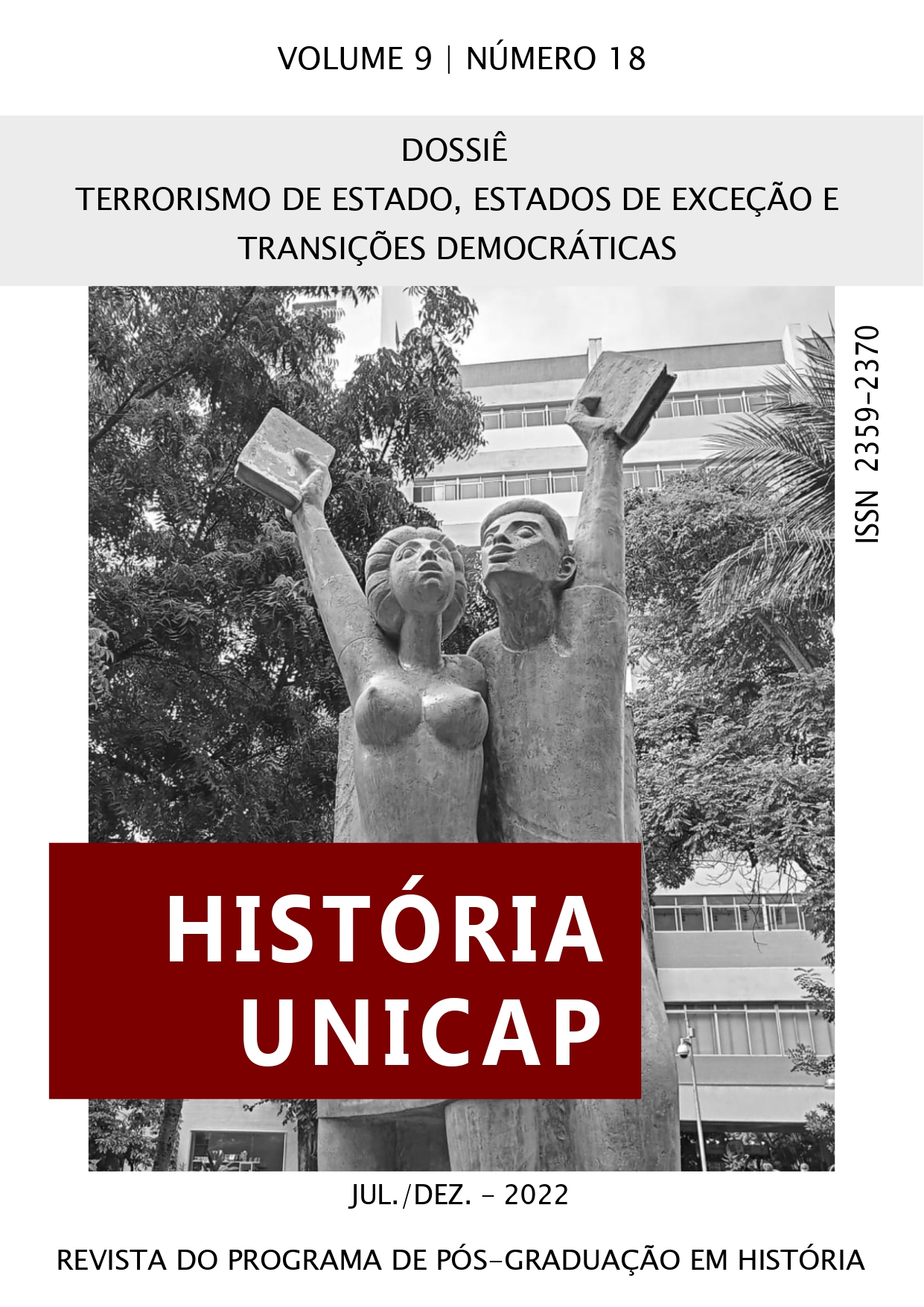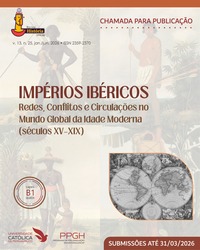Rethinking Lustrations
The Challenges of Executing Lustration in Ukraine
DOI:
https://doi.org/10.25247/hu.2022.v9n18.p88-106Keywords:
Lustration, Ukraine, Czechoslovakia, Euromaidan, Corruption, SocialismAbstract
Shortly after the Euromaidan protests in 2014, the new Ukrainian government passed two acts to consolidate democracy by means of lustration and vetting. Whilst the first Act On the restoration of trust in the judiciary concerns the judicial system only, the second ActOn Government Cleansingimpacts most of the public sector, as well as the military. The legislation was supported by the Civic Lustration Committee, whose main goal was to make sure that the President adopted their proposals for lustration. As this did not turn out to be the case, they gathered expertise from Central and Eastern Europe to draft the Law on Government Cleansing. The expertise consisted of various lawmakers and academics from Czech Republic, Poland, and Georgia (CIVIC LUSTRATION COMMITTEE, 2015). From these, the study has looked at how the Czechoslovak lustration resemble with the Ukrainian ones, as there is direct evidence of cooperation and both countries adopted exclusive lustrations. Specifically, it looks at their creation, reception, and effectivity. It argues that the Ukrainian lustrations do not fall within the framework of scholarship on transitional justice due to violence, lack of compatibility with the human rights, as well as the lack of effectivity in executing lustrations.
Downloads
References
BERGAME, Uma. ‘The Fate of the Former KGB Agents in Latvia.’ Foreign Policy Research Institute, 2021. Available from:https://www.fpri.org/article/2018/03/the-fate-of-former-kgb-agents-in-latvia. Accessed: 21 Apr. 2021.
BÍLEK, Libor. I undertake voluntarily… - Residents, agents, informers and others. The State Security’s secret collaborators, 1945-1989 in Behind the Iron Curtain, vol.4, pp.94-111, Available from: https://www.ceeol.com/search/chapter-detail?id=541338. Accessed: 29 Dec. 2021.
Civic Lustration Committee et US Aid: Report on the results of monitoringimplementation of the Lawsof Ukraine On GovernmentCleansing and On RestoringConfidence In the Judiciary. 92 p., 2017. Accessed: 21 Mar. 2021.
Civic Lustration Committee. Year of Lustration in Ukraine: History of Victory and Sabotage. Kyiv, 2015. Accessed: 19 Oct. 2020.
CROSSLEY-FROLICK, Katy A. The Fate of Former East German Police in Reunified Germany, 1990-1996: The Dialectics of Inclusion and Exclusion. Journal of Historical Sociology, vol. 23, no. 2, pp. 251-283, 26 Apr. 2010. Available from: https://doi.org/10.1111/j.1467-6443.2010.01370.x. Accessed: 1 Mar. 2021.
DAVID, Roman. From Prague to Baghdad: Lustration Systems and their Political Effects. Government and Opposition, vol. 41, no. 3, pp. 347-372, 2006. Available from: https://doi.org/10.1111/j.1477-7053.2006.00183.x. Accessed: 15 Mar. 2020.
DAVID, Roman. Lustration and transitional justice: personnel systems in the Czech Republic, Hungary, and Poland. Choice Reviews Online, vol. 49, no. 08, pp. 49-446, Apr. 2012. Available from: https://doi.org/10.5860/choice.49-4699. Accessed: 15 Mar. 2020.
DECREE OF THE CABINET OF MINSITERS OF UKRAINE. ‘On creation of the Ukrainian Institute of National Memory from 2006.’in Igor Lyubashenko. ‘Historial Justice.’ Transitional Justice in Post-Euromaidan Ukraine, Bern: Peter Lang Edition, 2017.
DEUTSCHE WELLE. Czech PM loses legal battle over secret police ties, 2018. Available from: https://www.dw.com/en/czech-pm-loses-legal-battle-over-secret-police-ties/a-42574312. Accessed: 23 Apr. 2021.
DUBOSKÝ, Patrik. Nation’s Memory Institute, Bratislava, August 2021. Interviewed by Martin Hochel.
EMBASSY OF UKRAINE in CANADA. ‘On Holodomor of 1923-33.’ Law of Ukraine. Available from: http://canada.old.mfa.gov.ua/en/ukraine-%D1%81%D0%B0/holodomor-remembrance/holodomor-remembrance-ukraine/holodomor-law-ukraine. Accessed: 28. Sept. 2021.
EUROPEAN HUMAN RIGHTS ADVOCACY CENTRE. MIDDLESEX UNIVERSITY. Polyakh and others v Ukraine. 2020. Available from: https://ehrac.org.uk/en_gb/resources/polyakh-and-others-v-ukraine/ Accessed: 23 Apr. 2021.
FIGES, Orlando. Chapter 12: Communism in Retreat? In Revolutionary Russia, 1891-1991. [S. l.]: Pelican, 2014. 336 p. ISBN 9780141043678.
FIRST CHANNEL. Zelensky wants lustration law to be extended to Poroshenko, officials during his presidency, 2019. Available from: https://1tv.ge/lang/en/news/zelensky-wants-lustration-law-to-be-extended-to-poroshenko-officials-during-his-presidency/. Accessed: 23 Apr. 2021.
GRICIUS, Gabriela. Transitional Justice: Lustration and Vetting in Ukraine and Georgia in Journal of Liberty and International Affairs,, vol.5, no.2, pp. 26-42, 2019. Accessed: 29 Dec. 2021.
HORNE, Cynthia M. International Legal Rulings on Lustration Policies in Central and Eastern Europe: Rule of Law in Historical Context. Law & Social Inquiry, vol. 34, no. 03, pp. 713-744, 2009. Available from: https://doi.org/10.1111/j.1747-4469.2009.01162.x. Accessed: 7 Mar. 2021.
KAMENAJ, Ivan. ‘Lustration in Albania: The past and the future.’ OSCE – Presence in Albania. 2021. Available from: https://www.osce.org/files/f/documents/e/4/445090.pdf. Accessed: 23 Apr. 2021.
KYIV POST. ‘Yatsenyuk: Ukraine lustration will cover 1 million officials.’ 2014. Available from: http://museum.khpg.org/en/index.php?id=11634183500. Accessed: 23 Apr. 2021.
LYUBASHENKO, Igor. ‘Decree of the Cabinet of Ministers of Ukraine.’ In Transitional Justice in Post-Euromaidan Ukraine. Peter Lang Edition, 2017.
LYUBASHENKO, Igor. ‘UchastSluzhbyBezpekyUkrayiny u reabilitatsiyizhertvpolitychnyhrepresiy v Ukrayini.’ Security Services of Ukraine. [S.l.] Peter Land Edition, 2017.
LYUBASHENKO, Igor. Transitional Justice in Post-Euromaidan Ukraine: Swimming Upstream. [S. l.]: Lang GmbH, Internationaler Verlag der Wissenschaften, Peter, 2016. 170 p. ISBN 9783631671498.
OGILVIE, Robert Maxwell. ‘Lustrum Condere’ in Journal of Roman Studies, vol. 51, no. 1-2, pp. 31-39, Nov. 1961. Available from: https://doi.org/10.2307/298833. Accessed: 20 Jun. 2019.
Open DEMOCRACRACY. Communists were banned, or so we thought, 2019. Available from: https://www.opendemocracy.net/en/odr/ukraines-communists-were-banned-or-so-we-thought/. Accessed: 23 Apr. 2021.
PACE. ‘Measures to dismantle the heritage of former communist totalitarian systems.’ 1996. Available from: https://assembly.coe.int/nw/xml/XRef/Xref-XML2HTML-en.asp?fileid=16507. Accessed: 28 Sept. 2021.
RT.COM. ‘Almost lynching’: Radicals attack Ukrainian officials, throw into trash bins. Available from: https://www.rt.com/news/194668-ukraine-officials-trash-lustration. Accessed: 23 Apr. 2021.
RYCHLÍK, Jan. The “Velvet Split ” of Czechoslovakia (1989 1992) inPoliteja, vol. 15, no. 6(57), pp. 169-187, 13 Aug. 2019. Available from:https://doi.org/10.12797/politeja.15.2018.57.10. Accessed: 13 Sep. 2021.
SIVOŠ, Jerguš. ‘Pokusy o pozmeňovaniezáznamov v registračnýchprotokolock KS ZBS Š-ŠtB Bratislava.’ In JAŠEK, Peter. Interpretáciadokumentovštátnejbezpečnosti. [S.l.] Ústavpamätinároda, 2010, 180 p. ISBN 9788089335466
SIVOŠ, Jerguš. Nation’s Memory Institute, Bratislava, November2020. Interviewed by Martin Hochel.
SLOV-LEX. ‘o združovaní v politickýchstranách a v politickýchhnutiach.’ Available from: https://www.slov-lex.sk/pravne-predpisy/SK/ZZ/1991/424/vyhlasene_znenie.html. Accessed: 28 Sept. 2021.
STERN, David. Ukraine's politicians face mob attacks. 2014. Available from: https://www.bbc.com/news/world-europe-29536641. Accessed: 23 Apr. 2021.
THE HELSINKI WATCH, Decommunization in Bulgaria, 5.14, 1993. Available from: https://www.hrw.org/sites/default/files/reports/BULGARIA938.PDF. Accessed: 23 Apr. 2021.
Venice Commission. Final Opinion on the Law on Government Cleansing (Lustration Law) of Ukraine, 13 Oct. 2009. Available from: https://www.venice.coe.int/webforms/documents/default.aspx?pdffile=cdl-ad(2015)012-e#:~:text=The%20Venice%20Commission%20accepts%20that,Government%20Cleansing%20are%20both%20legitimate.&text=Functionaries%20of%20the%20Public%20Administration,%2F2009%2C%2013%20October%202009. Accessed at: 15 Jul. 2020.
VERKHOVNA RADA of UKRAINE. ‘Law of UkraineOn Lustration.’ 2014. Available from: https://zakon.rada.gov.ua/laws/anot/en/1682-18. Accessed: 29 Dec. 2021.
VIRTUAL MUSEUM. ‘Dissent Movement in Ukraine.’ On the Rehabilitation of Victims of Political Repression in Ukraine, Law of the Ukrainian SSR. Available from: http://museum.khpg.org/en/index.php?id=11634183500. Accessed: 23 Apr. 2021.
ŽÁČEK, Pavel. Demontáž a očistabezpečnostníchstruktur in Paměť a Dějiny, Vol.IV, no. 01, pp. 59-78, 2010. Available from: https://www.ceeol.com/search/article-detail?id=255945. Accessed: 16 Feb. 2021.
ŽÁČEK, Pavel. Můžoupřijít, jsmehotovi…. In PamäťNároda, pp.28-41, 2004. Available from: https://docplayer.cz/3182183-Muzou-prijit-jsme-hotovi.html. Accessed: 25 Feb. 2021.
ŽÁČEK, Pavel. Zametání stop. Ničenísvazkovéagendy v prosinci 1989 u centrálníchútvarůStátníbezpečnosti in SborníkArchivuBezpečnostníchSložek, Vol.13, pp.213-293, 2015. Available at: https://www.abscr.cz/sbornik-abs/sbornik13/. Accessed: 25 Feb. 2021.
ZÁKONY PRE ĽUDÍ. ‘ZÁKON ČESKÉ NÁRODNÍ RADY O NĚKTERÝCH DALŠÍCH PŘEDPOKLADECH PRO VÝKON NĚKTERÝCH FUNKCÍ OBSAZOVANÝCH USTANOVENÍM NEBO JMENOVÁNÍM PŔÍSLUŠNÍKÚ POLICIE ČESKÉ REPUBLIY A PRÍSLUŠNÍKÚ NÁPRAVNÉ VÝCHODY ČESKÉ REPUBLIKY.’ 1992. Available from: https://www.zakonyprolidi.cz/cs/1992-279. Accessed: 29 Dec. 2021.
ZÁKONY PRE ĽUDÍ. ‘Zákon, ktorýmsaustanovujúniektoréďalšiepredpokladynavýkonniektorýchfunkcií v štátnychorgánochaorganizáciáchČeskej a SlovenskejFederatívnejRepubliky, Českejrepubliky a Slovenskejrepubliky.’ 1991. Available from: https://www.slov-lex.sk/pravne-predpisy/SK/ZZ/1991/451/vyhlasene_znenie.html. Accessed: 29 Dec. 2021.
Downloads
Published
Issue
Section
License
Copyright (c) 2023 HISTÓRIA UNICAP

This work is licensed under a Creative Commons Attribution 4.0 International License.
Concedo a Revista História Unicap o direito de primeira publicação da versão revisada do meu artigo, licenciado sob a Licença Creative Commons Attribution (que permite o compartilhamento do trabalho com reconhecimento da autoria e publicação inicial nesta revista).
Afirmo ainda que meu artigo não está sendo submetido a outra publicação e não foi publicado na íntegra em outro periódico e assumo total responsabilidade por sua originalidade, podendo incidir sobre mim eventuais encargos decorrentes de reivindicação, por parte de terceiros, em relação à autoria do mesmo.
Também aceito submeter o trabalho às normas de publicação da Revista História Unicap acima explicitadas.















 A História Unicap está licenciada com uma licença
A História Unicap está licenciada com uma licença 